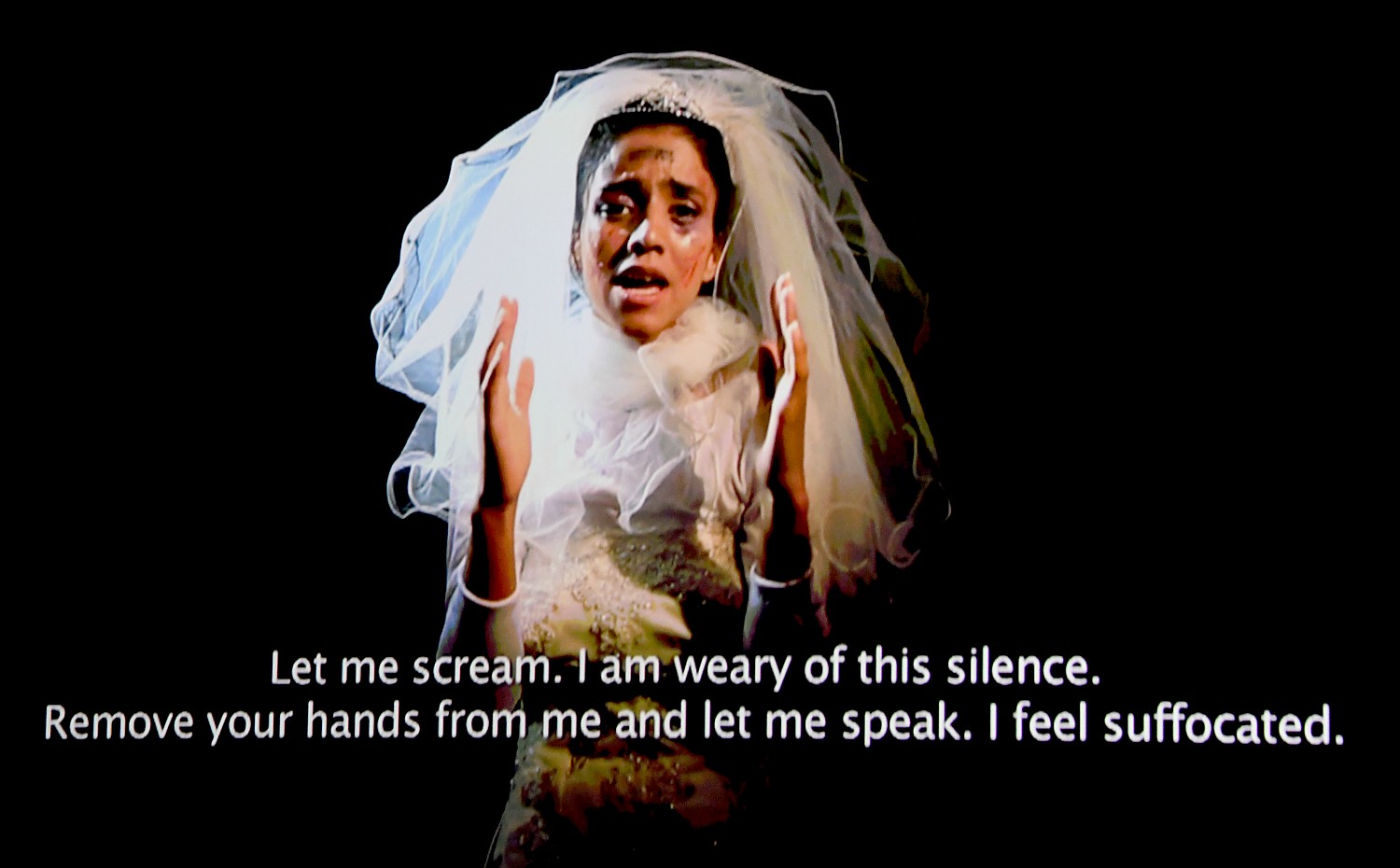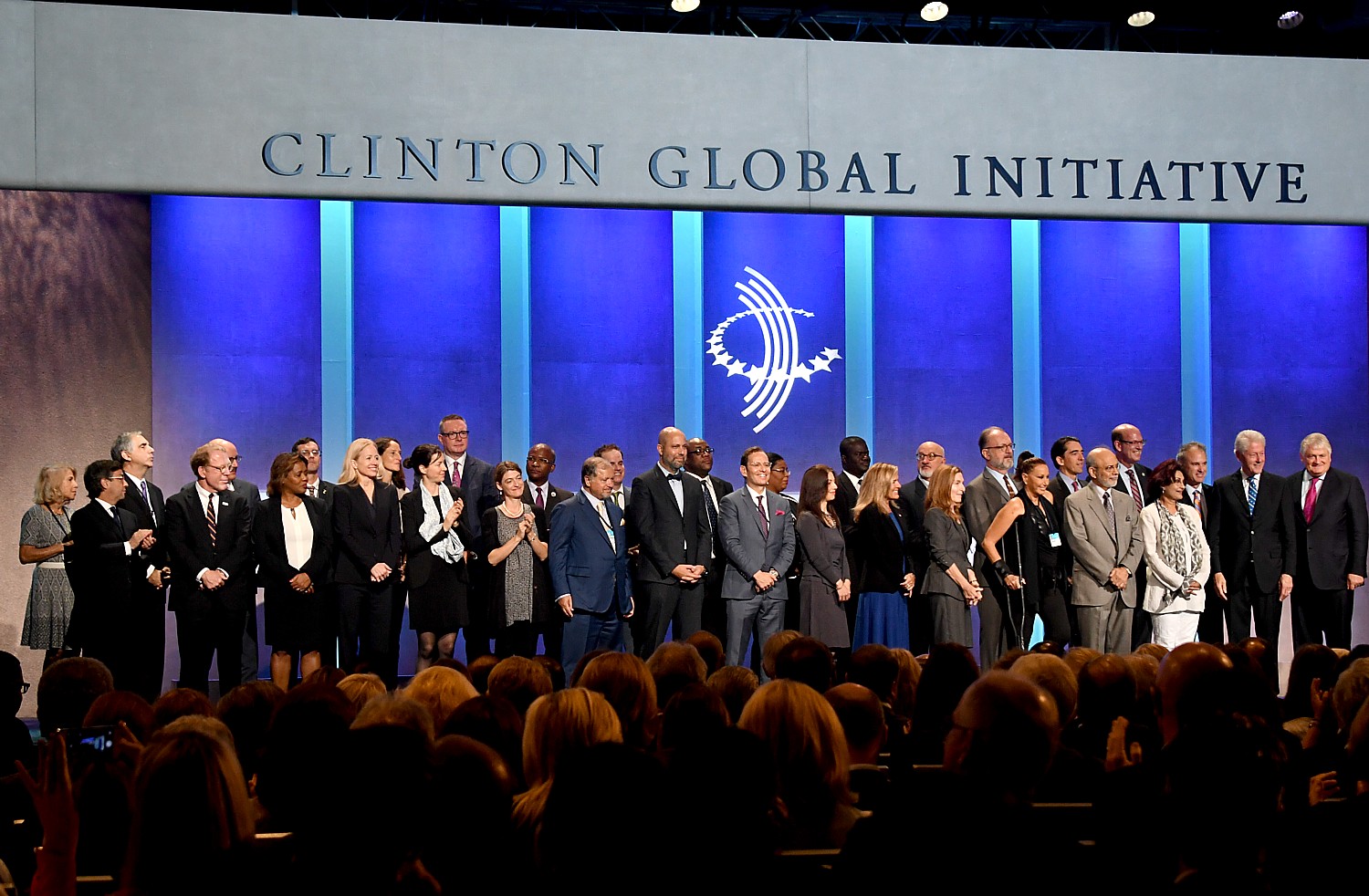
By Karen Rubin, News & Photo Features
I am so sick of Donald Trump and his sleezy band of “surrogates” attacking the Clinton Foundation as if it were run in the same way and for the same purpose as the corrupt and self-serving Trump Foundation, rather than being the catalyst for sustainable development that has meaningfully lifted millions out of poverty, provided life-saving medications and vaccines, expanded health care and educational opportunities, fostered the cultural changes to lift up women and girls and reduce gender violence and inequality. And that’s just for starters.
At an emotional Closing Plenary Session of the 12th and final Clinton Global Initiative – the annual meeting that brings together philanthropists, corporations, government leaders and non-governmental organizations to partner together on sustainable projects that actually help solve the intractable problems of the world, from poverty to gender inequality to conflict resolution -, President Clinton delivered a personal reflection on what the last 15 years of the Clinton Foundation have meant to him and discussed how CGI helped redefine philanthropy.
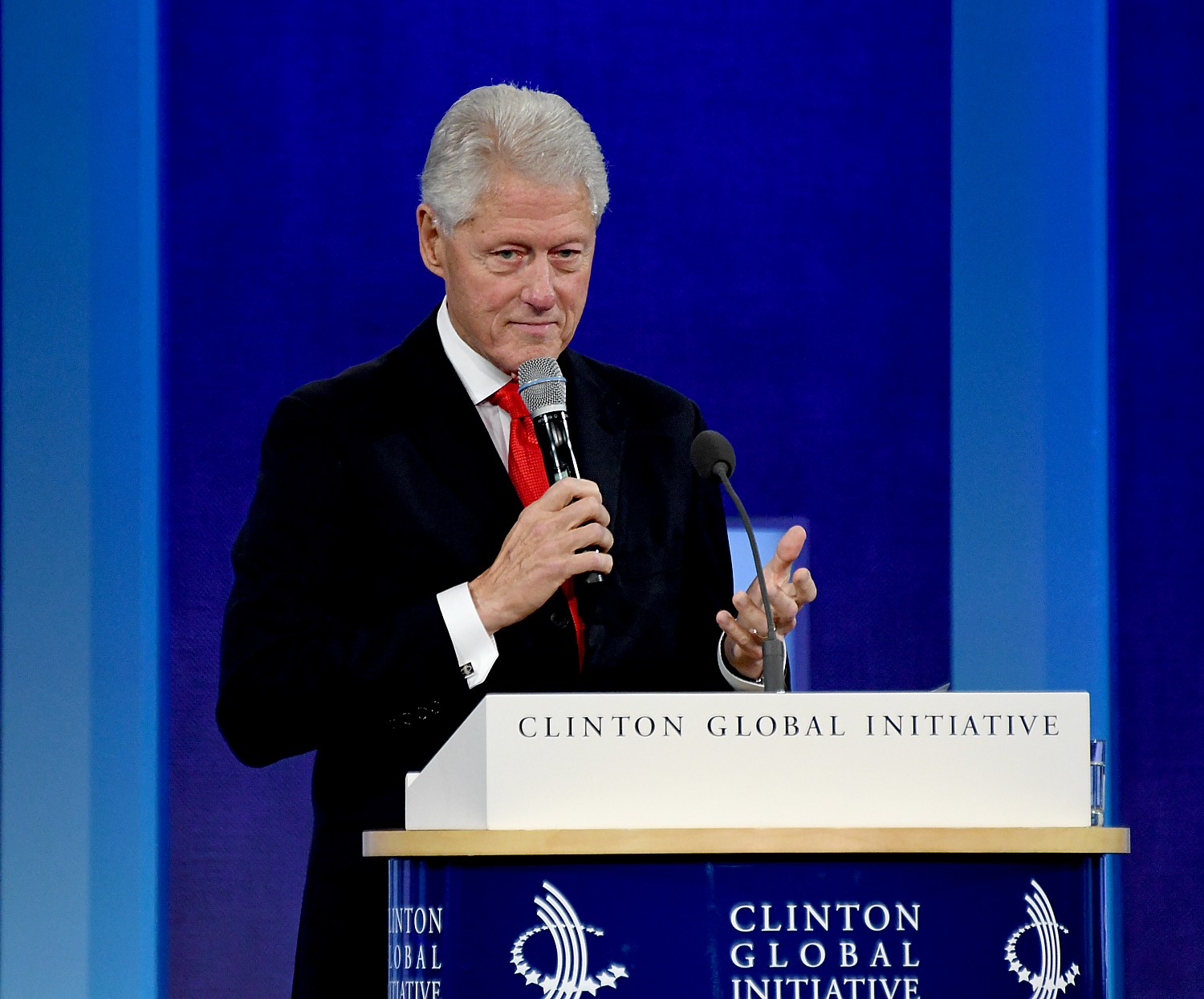
“It has been one of the great honors of my life. You are living proof that good people committed to create cooperation have almost unlimited positive impact to help people today and give our kids better tomorrows. I have spent the last 15 years of my life working to advance that idea,” President Clinton said.
During the three days of the gathering, CGI “members” (who are obligated to make and implement commitments) discussed and announced 96 new Commitments to Action to continue driving progress on pressing global issues, including preventing the spread of Zika, addressing the refugee crisis in Syria, reducing violence against women in the developing world, peacebuilding in post-conflict areas, and strengthening business supply chains so that companies can do well by doing good.
What started with 600 commitments in 100 countries in CGI’s first two years has since grown to more than 3,600 commitments spanning more than 180 countries, which have improved the lives of over 435 million people. The impact of CGI will continue through the work of CGI members who are implementing their Commitments to Action. When fully funded and implemented, commitments announced by CGI members over the past 11 years will ensure that:
- More than 52 million childrenhave access to a better education.
- More than 33 million peoplehave increased access to safe drinking water and sanitation.
- More than 13 million girls and womenhave been supported through empowerment initiatives.
- More than $1.6 billionhas been invested or loaned to small- and medium-sized enterprises.
- Nearly 35 million peoplehave access to information technologies.
- More than 50 million farmers or small-scale producers have gained access toinputs, supports, and markets
- More than 8 million people have gained skills to cope with the risks of environmental stress and natural disasters.
- More than 401 million acres of foresthave been protected or restored.
- Nearly 4 million clean jobs have been created.
- More than 114 million peoplehave increased access to maternal and child health and survival programs.
- More than $318 million in research and development funds has been spent on new vaccines, medicines, and diagnostics.
“I started CGI in 2005 because I believed people wanted to come together and work together to solve big problems and seize key opportunities.,” said President Clinton. “It has changed the landscape of modern philanthropy. Putting ideas into action is no longer the exception but the rule. I look forward to seeing new Commitments to Action announced which will continue to improve lives long into the future.”
“Every year, CGI’s Annual Meeting has been a place where we see unlikely partnerships form – in the hallways, at a discussion table, or right on stage,” said Chelsea Clinton. “I’m excited to see what partnerships emerge this year to tackle challenges in education, global health and development broadly – and to look back and continue to learn from the impact of CGI partnerships through the years on pivotal issues like Ebola relief, disaster response, increased opportunities for girls and women, climate change, and sustainable economic development.”
CGI built a forum for government, business, and civil society to come together and turn ideas into action through the Commitment to Action model — the defining feature of CGI. Since the first Annual Meeting in 2005, CGI has brought together nearly 190 sitting and former heads of state, more than 20 Nobel Prize laureates, hundreds of business, philanthropic, non-profit leaders, and influential civic voices. Timed to continue the dialogue on the United Nations Sustainable Development Goals, the CGI Annual Meeting has guided members to expand and replicate proven solutions to pressing challenges.
At the meeting, several CGI members expressed their appreciation and gratitude for the work of CGI within their remarks, including:
Zainab Salbi, Founder of Women for Women International, said, “I have been a proud member of CGI since 2005. I have witnessed its unique, practical, and measurable contributions in the world, the opportunities it created for marginalized voices to be heard, and how it helped push social issues otherwise ignored to the limelight. This may be the last Annual Meeting, but the work and the spirit of President Clinton’s mission and the CGI committed community will live on forever.”
The theme of CGI is “Turning Ideas Into Action,” and Paul Polman, CEO of Unilever noted, “the Clinton Global Initiative has done much more than that. It has been an enormous convening power to bring people together who otherwise would not have come together.”
“The question you need to ask them is it’s not just about how to innovate, but how to innovate and develop a business model which produces global access to that idea. Because innovation that nobody gets access to is not innovation,” said Andrew Witty, Chief Executive Officer, GlaxoSmithKline
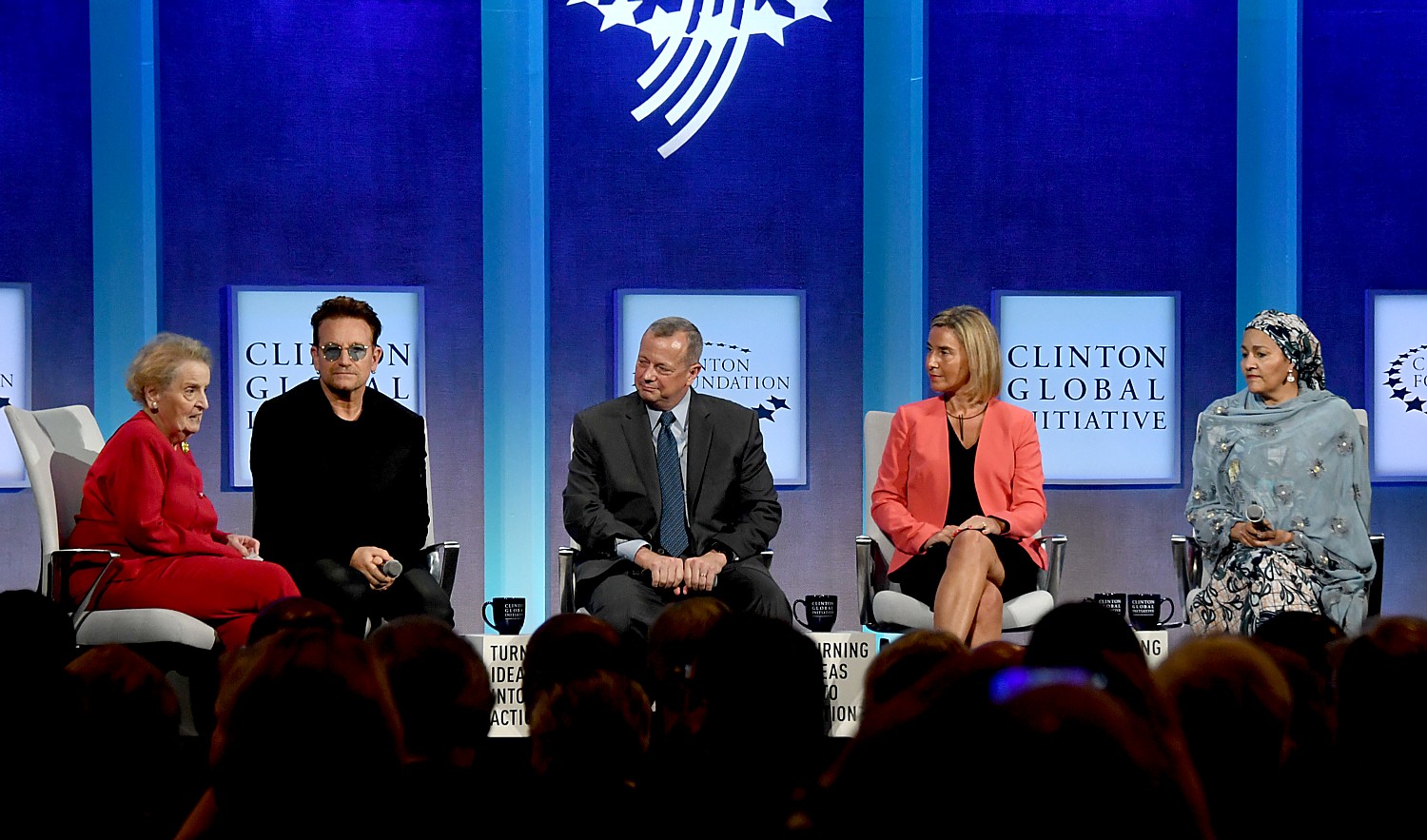
“The truth is you cannot find a more dedicated group of problem solvers, visionaries and altruists anywhere in the world than at CGI,” Madeleine Albright, Chair, Albright Stonebridge Group, said. “The Clinton Foundation had done more to help alleviate poverty and disease, and further global development than any platform I know.”
(See: Clinton Global Initiative Has Been Catalyst to Solving World’s Most Intractable Problems)
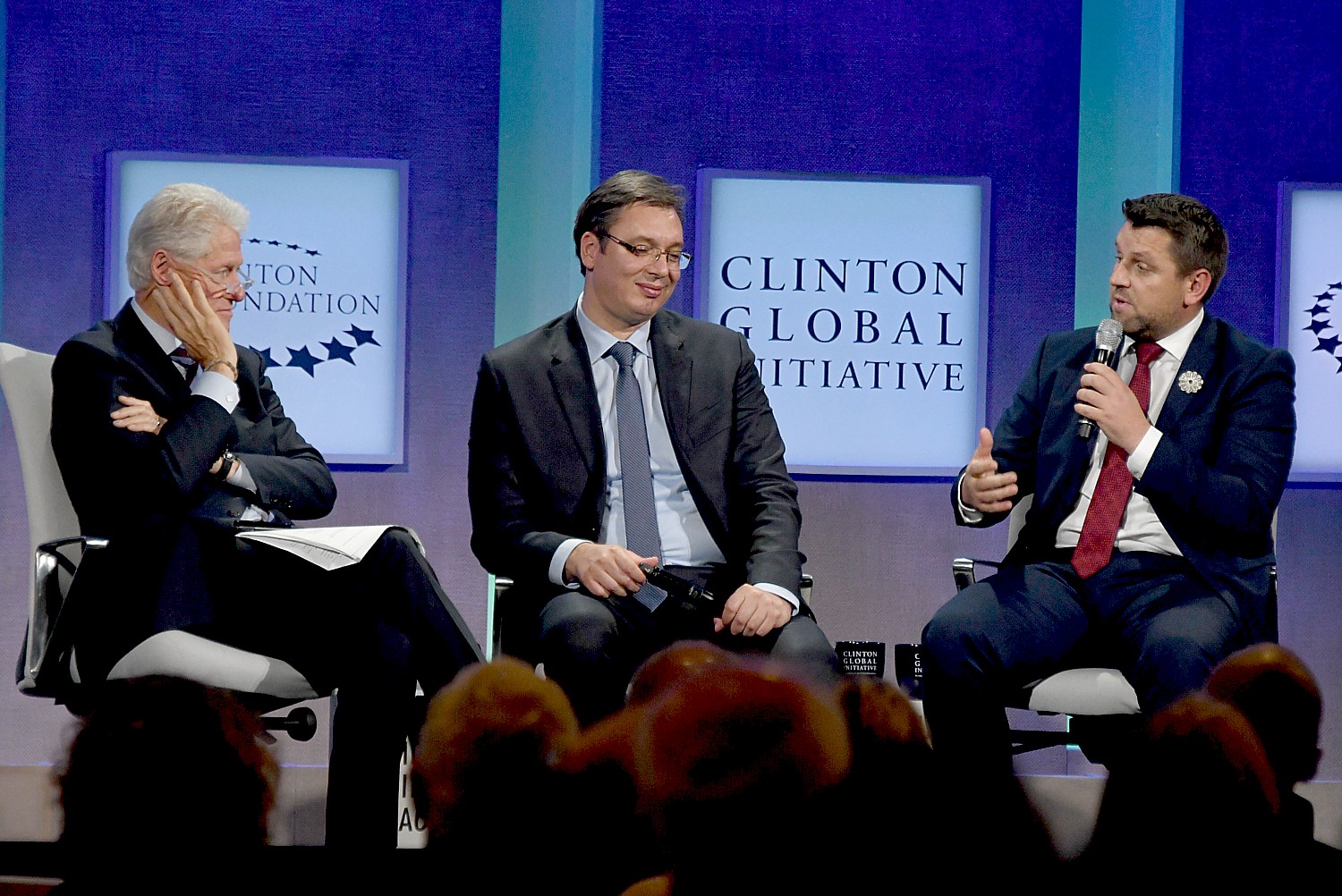
The final CGI was a kind of valedictory, reflecting back on what has been achieved, and in some ways, ending up the way it started, with a strong focus on Women and Girls (because when women succeed, society succeeds), and conflict resolution, with extremely stirring presentations that featured Aleksandar Vucic, Prime Minister, Serbia, together with Camil Durakovic, Mayor, Municipality of Srebrenica who have managed to come together 21 years after the massacre at Srebrenica, and Juan Manuel Santos Calderón, President, Colombia, honored as with a Global Citizen Award for
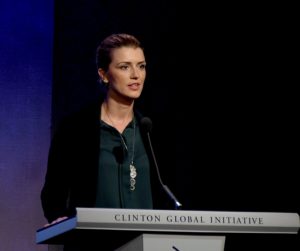
making peace after 50 years of civil war; Advija Ibrahimovic a survivor of Srebrenica, who presented a Global Citizen Award to Nadia Mura for the courage to tell her story of being kidnapped and exploited by ISIS who after her escape has become a voice for the thousands of women and children who have been trafficked in situations of conflict.
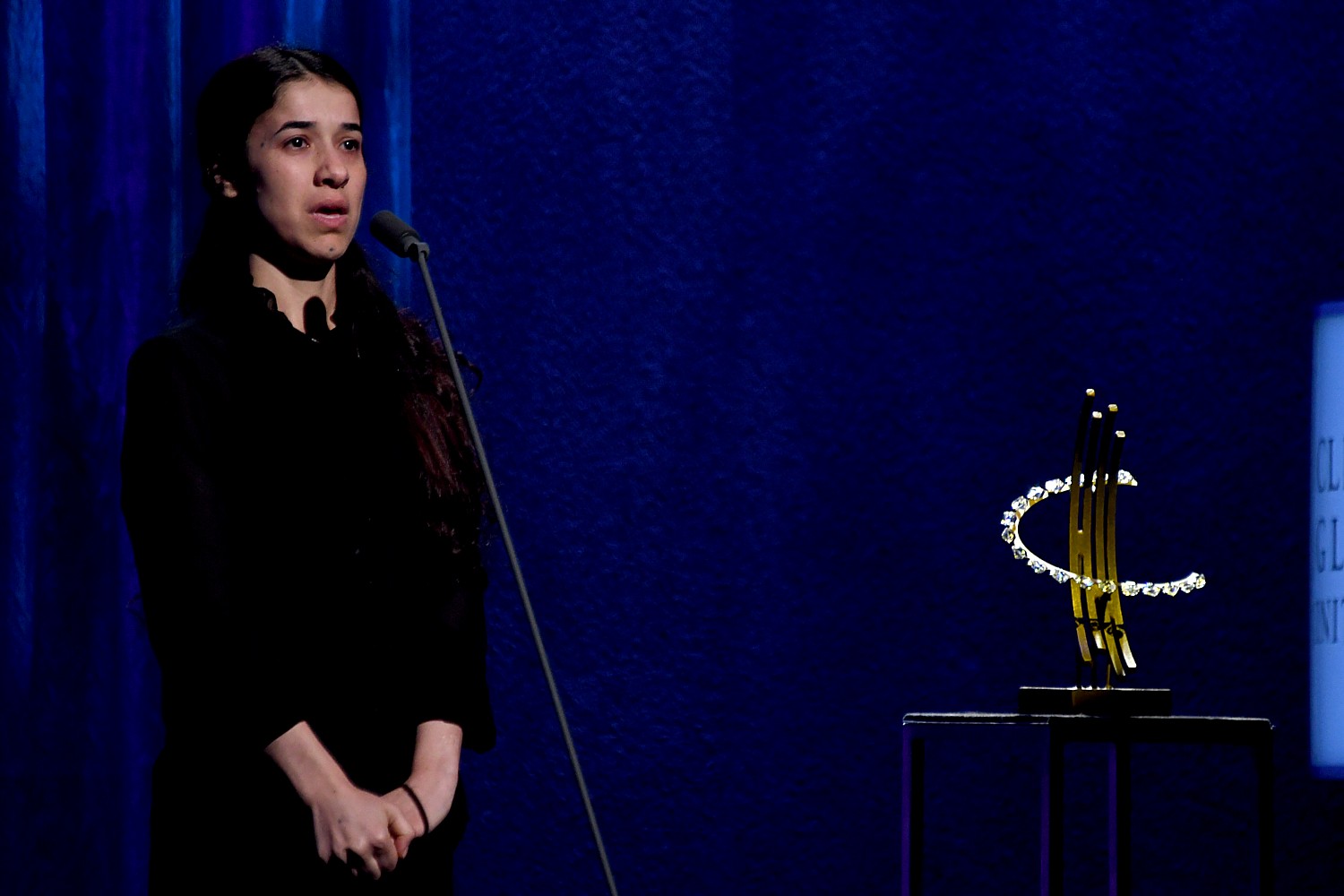
(See: Five are Honored with Global Citizen Awards at Final Clinton Global Initiative)
What can the Trump Foundation show? It does not have a legal certificate to solicit the millions of dollars, does not spend Donald’s own money but takes credit for others’ contributions, uses contributions to bolster his business and his personal reputation. He went on TV to solicit funds for veterans groups (as an excuse to not show up at a Republican debate) but only actually gave up the money after being exposed by the press (illegal to do that). He used his contribution to sway the Florida Attorney General Pam Bondi from investigating the Trump University fraud. Donald Trump has launched a new personal attack saying “follow the money”. Well here it is:
Among the new commitment announcements from the 12th and final Annual Meeting were those addressing critical issues such as the refugee crisis and the containment of infectious diseases like Zika, and a score of commitments aimed at addressing violence against women and gender inequality.
Here are details of just some of the commitments, in the hopes they will provide models for others to follow after there is no more Clinton Global Initiative to catalyze such partnerships, to inspire and to monitor and bring them to fruition:
- U.ME.WE Campaign
Commitment by: Ubuntu Education Fund
Partner(s): Colin Cowie Events; De Agostini SpA; Eastern Cape Province Department of Health; Knowledge is Power Program; McKinsey & CompanyPROGRESS REPORT: In 2012, Ubuntu Education Fund committed to launch the U.ME.WE. Campaign, a three year, $25 million initiative to provide long-term financial stability and develop the Ubuntu Centre in Port Elizabeth, South Africa into a world class health and education campus, transforming the lives of 2,000 children and their families from cradle to career. Led by an experienced and dedicated medical team, the organization’s health program offered comprehensive HIV/TB services from testing to adherence support, sexual and reproductive health interventions, primary care, and nutritional support. Ubuntu has provided well over 24,200 medical services to 2,000 of Port Elizabeth, South Africa’s most vulnerable children, as well as piloted an early childhood development program that has grown from 38 to 148 children, created a university preparation program for Grade 12 scholars, and enhanced household security through Ubuntu’s Family Support Specialists. Through this Clinton Global Initiative commitment, the organization has ensured that the birthplaces of 2,000 orphaned and vulnerable children living in Port Elizabeth’s townships do not have to determine their futures.
- Amplifying the Voices of Poor Women to Create Inclusive Cities
Commitment by: Society for the Promotion of Area Resource Centers (SPARC)
Partner(s): Arghyam; Cities Alliance; Shack/Slum Dwellers International; Tata Trusts; United Cities and Local Governments AfricaNEW: In 2016, the Society for the Promotion of Area Resource Centers (SPARC) and their partners committed to amplify the voices of slum dwellers in Odisha and Maharashtra, India. Over the next three years, SPARC, in collaboration with partners and local governments, will train local informal residents and collect previously absent and unattainable citywide slum data, while developing projects to address the priority issue areas articulated by residents in seven towns with the greatest demonstrated WASH and vulnerable housing needs in India. The participation and leadership of slum dwellers is key to demonstrating inclusive and equitable city development planning, which should incorporate the participation of and reflect the needs of resident slum dwellers, from start to finish. Ultimately, this Commitment to Action will impact more than 1,300,000 slum dwellers in more than 1,000 slum communities throughout India.
- Increasing Adoption of Clean Energy Technology in Mozambique
Commitment by: Edp – Energias De Portugal, S.A.
Partner(s): OIKOS – Cooperação e Desenvolvimento; Leigos para o Desenvolvimento; SAN-JFSNEW: In 2016, EDP – Energias de Portugal, S.A. committed to launch a program that will promote community adoption and integration of electricity in the village of Titimane in Mozambique. Titimane will gain access to electricity for the first time through the development of a renewable-energy powered mini-grid. While this new access to clean energy will promote sustainable economic development, EDP is well aware of the challenges off-grid villages face in transitioning away from previous energy sources and adopting new clean energy technologies. Working with two local NGO implementation partners, EDP will develop an integrated behavior-based economic development approach that will enable all 4,000 members of the community to leverage this new access to electricity by providing comprehensive outreach, training and community programming over 2.5 years in four focus areas: entrepreneurship, education, health, and community empowerment.
- Haiti Commitment Cluster
PROGRESS REPORT: Approximately 30 organizations who have made commitments through the Haiti Action Network will announce progress and celebrate the over 100 commitments that have been made to benefit Haiti, including commitments made by Habitat for Humanity, Heifer Project International, Heineken, Marriot International, Inc., The Timberland Company, and West Elm. New commitments will also be announced to improve Haiti’s education, expand economic opportunity, and increase sustainability. - Tackling Childcare: Good for Business and Development
Commitment by: IFC
Partner(s): Aeromexico; Afrifresh; Axiata Group; Bauducco; Care.com, Inc.; Danone; Dialog Axiata Plc; EY; Grupo M; HBL Bank; HCL Technologies Limited; Institute for Women’s Policy Research; International Labour Organization; Kidogo; MAS Holdings (Pvt) Ltd.; Pepsico; Safaricom Limited; Sumimoto Chemical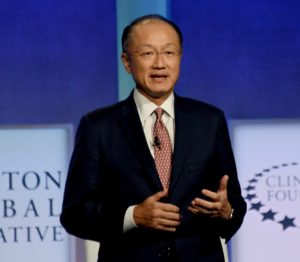
Jim Yong Kim, President, World Bank Group © 2016 Karen Rubin/news-photos-features.com NEW: In 2016, IFC (a member of the World Bank Group), brought together a group of private sector companies operating in a variety of different business sectors in emerging as well as developed markets to identify and implement childcare solutions that are good for business, employees, and communities. Private sector partners commit to at least three gender smart measures from a menu of options that focus on substantiating the business case for employer-supported childcare and putting this business case into practice. Strategic partners will provide knowledge, best practices, lessons learned, and data to help the private sector commitment members realize their commitments. The Tackling Childcare Secretariat housed in IFC will provide technical expertise, host learning events, provide communications opportunities, and compile the group’s learning on how employer-supported childcare can work in different regions, industries, and business environments in a global best practice “Tackling Childcare” report on employer-supported childcare. Ultimately, the commitment aims to directly impact the lives of working parents in participating organization, improve learning and awareness about the business case and best practices for employer-supported childcare, and encourage others to start or scale up their own employer-supported childcare efforts.
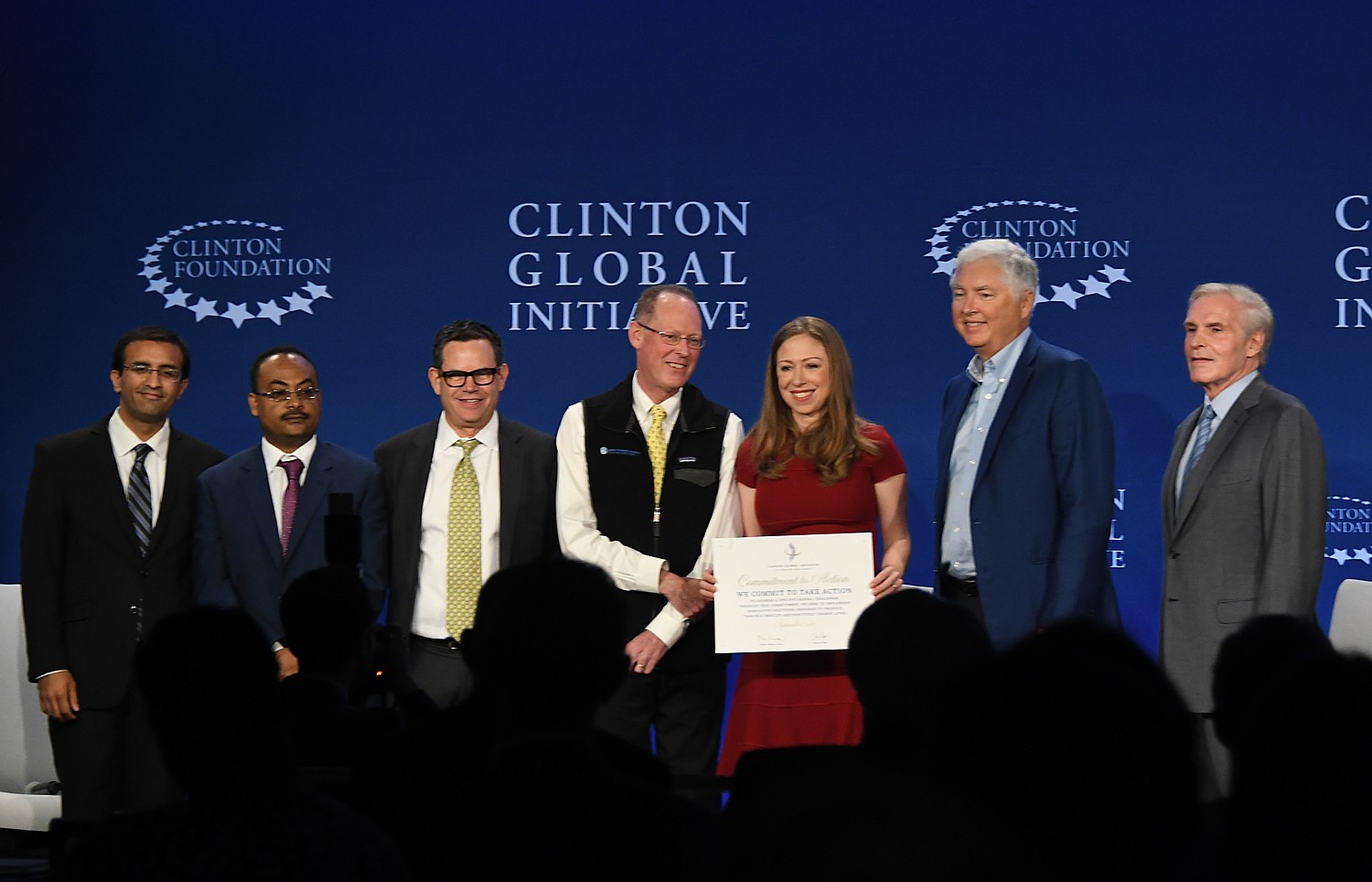
Chelsea Clinton announces a commitment to help save elephants by curbing demand for ivory © 2016 Karen Rubin/news-photos-features.com - The New Luxury: Catalyzing Influencers to Curb Global Ivory
Commitment by: Save the Elephants
Partner(s): Tiffany & Co.; Marc Jacobs International; DNA Model Management; Edelman; Doutzen KroesNEW: In 2016, Save the Elephants, in partnership with Elephants Action Network Members, the U.S. Wildlife Trafficking Alliance, and leading industry influencers including Tiffany & Co., Marc Jacobs International, DNA Model Management, Edelman, and Doutzen Kroes committed to the creation of a multi-stakeholder campaign leveraging their global taste-making status to curb the demand for elephant ivory in key buying markets. Fashion influencers, those brands and individuals who create and steward the goods and preferences that are so central to consumers’ identities, will communicate out their commitments to ivory-free products and lifestyles via a range of media platforms. Influencers will simultaneously drive $1 million in donations to the Elephant Crisis Fund, which supports anti-poaching efforts facing immediate need, via the unified #knotonmyplanet campaign. This messaging overtly links the consumption of ivory with the killing of elephants, and along with tailored influencer-created assets, will target populations in the United States and high-ivory demand East Asian countries at strategic intervals.
- Igniting Ideas for Greece’s Future: The Angelopoulos 100 (CGI Annual Meeting 2016)
Commitment by: Gianna AngelopoulosNEW: In 2016, Ambassador Gianna Angelopoulos committed to scaling up her efforts to develop young Greek social entrepreneurs by recruiting, selecting, training, and supporting 100 Angelopoulos Fellows in implementing and sustaining projects that address Greece’s major challenges. Due to the financial crisis that has plagued Greece for almost a decade, career opportunities are limited and well educated young Greeks are quickly leaving the country. This commitment will connect young Greeks with relevant experts, mentorship opportunities, access to capital, and connections to international contacts and conferences to support them in their entrepreneurial endeavors. Creating an extensive, ongoing community network for the 100 Fellows will assist them in developing successful social enterprises that will positively impact communities across Greece.
- Disabilities: Social & Financial Inclusion for Women & Girls
Commitment by: Keystone Human Services
Partner(s): Czech Development Agency; East European Foundation; Moldova, Republic of; National Agency for Employment; Soros Foundation; Step by Step Management, Inc.; Swedish Organization for Individual Relief; United States Agency for International Development; Winrock InternationalPROGRESS REPORT: In 2013, Keystone Human Services committed to improve social and financial inclusion for women and girls with disabilities in the United States and Eastern Europe, specifically in Pennsylvania, Moldova, and Russia. Through this commitment, Keystone aims to deinstitutionalize young women with disabilities, moving them from state institutions to community homes, and provide them with the necessary, community-based support structures. A complementary program aims to establish an inclusive, family-oriented, workforce model that effectively reduces obstacles to employment for women with disabilities and women caregivers of children with disabilities. Initially, Keystone intended to impact that lives of 60 women and girls, but the program has seen incredible successful and far exceed expectations. In Moldova, The Equal Access to Education program, an inclusive education project, has been piloted in 22 schools, and is being promoted and replicated at the national level. This has benefited many girls who now have access to education, health services, orthopedic and optical items, rehabilitation centers, physical therapy, counseling, and psychological support.
- Life Saving Healthcare for Syrian Refugees in Lebanon
Commitment by: Unipol Gruppo Finanziario SpA
Partner(s): United Nations Refugee AgencyNEW: In 2016, Unipol committed to provide humanitarian assistance to more than 300 refugees over two years in Lebanon, which is host to the highest number of Syrian refugees in proportion to its population size. Unipol will contribute a cash donation to the United Nations High Commissioner for Refugees (UNHCR), which will provide treatment for emergency and lifesaving secondary and tertiary healthcare, such as normal and caesarian deliveries, as well as hospitalization costs and surgeries for emergency care. Rather than establishing new services, UNHCR will offset costs to ensure that Syrian refugees can access quality public healthcare. Complementing this donation, Unipol will raise awareness of the plight of Syrian refugees in host countries by implementing a communication campaign in Italy. With approximately 15,000 employees and over 16 million customers, Unipol will give UNHCR the possibility to reach a widespread audience. In addition, clients subscribing to Unipol life insurances will be given the option to indicate UNHCR among their beneficiaries, providing a key fundraising opportunity for UNHCR.
- Building Peace: Higher Education for Syrian Youth
Commitment by: Syria Relief and Development
Partner(s): University of IdlibNEW: In 2016, Syria Relief and Development (SRD) committed to supporting the University of Idlib in northwestern Syria over a period of two years to ensure continued access to higher education and prevent brain drain as a significant percentage of the population flees the country due to the ongoing civil war. Recognizing the vital – yet underfunded – role of tertiary education during times of crisis, SRD will provide free tuition to over 1,300 enrolled students (focusing on at-risk populations) and provide the departments of pharmacy, mechanical engineering, education, and agriculture with financial support, consulting services, educational technology, and assistance with curriculum development. Additionally, SRD will introduce a job training and internship program for more than 300 students, as well as reproductive health, family planning, and skills building courses for 500 women. As a result, SRD will ensure that the education of the next generation of Syrian doctors, civil engineers, and teachers will not be placed on hold.
- Business and Employability Skills in Jordan
Commitment by: City & Guilds Group; Near East FoundationNEW: In 2016, Near East Foundation (NEF) and Building Markets committed to providing business development and employability skills training to over 6,000 refugees and Jordanians over two years, addressing the economic vulnerabilities that refugees and Jordanians alike face. NEF and Building Markets will focus on women and youth, thus contributing to their financial self-reliance, and will prioritize areas in Jordan with a high number of refugees and concentrated poverty. NEF will deliver training in livelihood support hubs, or “Siraj Centers”, where local Master Trainers will help women and youth refugees to build skills to either find employment or to start their own micro-enterprises and generate stable income. In addition, Building Markets and NEF will provide advanced support to at least 300 participants who demonstrate high business growth potential to scale their ventures, increasing income and creating job opportunities for Jordanians and refugees.
- FARMS: Bridging the Humanitarian-Development
Commitment by: International Fund for Agricultural Development (IFAD)
Partner(s): Jordan Enterprise Development Corporation; Jordan River Foundation; Ministry of Planning and International Cooperation, JordanNEW: In 2016, the International Fund for Agricultural Development (IFAD) committed to establish the Facility for Refugees, Migrants, Forced Displacement, and Rural Stability (FARMS) to raise $100 million in new funds for agricultural development targeted towards rural communities, refugees, and displaced individuals. FARMS will support agriculture-related training, financial access and adaptation technologies to increase the self-reliance of refugees and strengthen the resilience of host communities. The commitment will focus on countries with large proportions of refugee and displaced communities and the initial focus will include Jordan, Iraq, and Sudan, with planned expansion to the broader Middle East and North Africa region. In the long term, FARMS will support projects that focus on restoring agricultural productivity in origin areas from where refugees have fled so that people who have left are motivated to return to their native countries, and those who remain have a chance to rebuild their lives.
- Transitioning Girls & Women from Cash to the Workforce
Commitment by: Women’s Refugee Commission
Partner(s): Danish Refugee Council; Mercy Corps; Norwegian Refugee CouncilNEW: In 2016, Women’s Refugee Commission (WRC) committed to safely transition refugee women and girls in Jordan and Turkey from cash assistance to the workforce in order to provide economic self-reliance and support women and girls as they re-connect or enter into the formal workforce for the first time. This will help to address a common sentiment among refugee women of powerlessness, hopelessness, high stress, and various protection risks, all of which are tied to a lack of financial resources. Over the course of two years, WRC will conduct research that builds on its current studies that demonstrate how cash-based initiatives can prevent gender based violence, and will build the capacity of partners in the private sector and non-governmental organization service providers to prepare displaced women and girls of working age to safely obtain formal employment. WRC will also build global awareness on issues such as the right to work and decent work legislation for refugee women and girls.
- Reinventing Refugee Employment and Integration in Italy
Commitment by: Kairos Rainbow Srl
Partner(s): Centro Astalli; Istituto Massimiliano Massimo; Italian Institute for Asia and the Mediterranean (ISIAMED); Jesuit Foundation for Education; Ristrutturazioni Italiana Srl; SCM Srl; Tras. Co. ItaliaNEW: In 2016, Kairos Rainbow committed to address the gap that exists in Italy between skilled refugees and a lack of job opportunities by providing 180 refugees, including from Somalia, Pakistan, and Syria, with language courses, legal counseling, and job placements to facilitate their social and economic integration in the country. To do so, over a period of two years, Kairos will partner with Italian companies who will create tailored training programs and offer internships which will ultimately make it easier for refugees to obtain full time employment, as well as partner with local organizations that will provide social services, such as assistance to renew residency and work permits. Through this commitment, Kairos aims to change the perception of refugees in Italy from scapegoats to integrated and empowered participants in the country’s economy and society. The commitment will pilot in Rome and, based on its success, will expand to other cities in Italy.
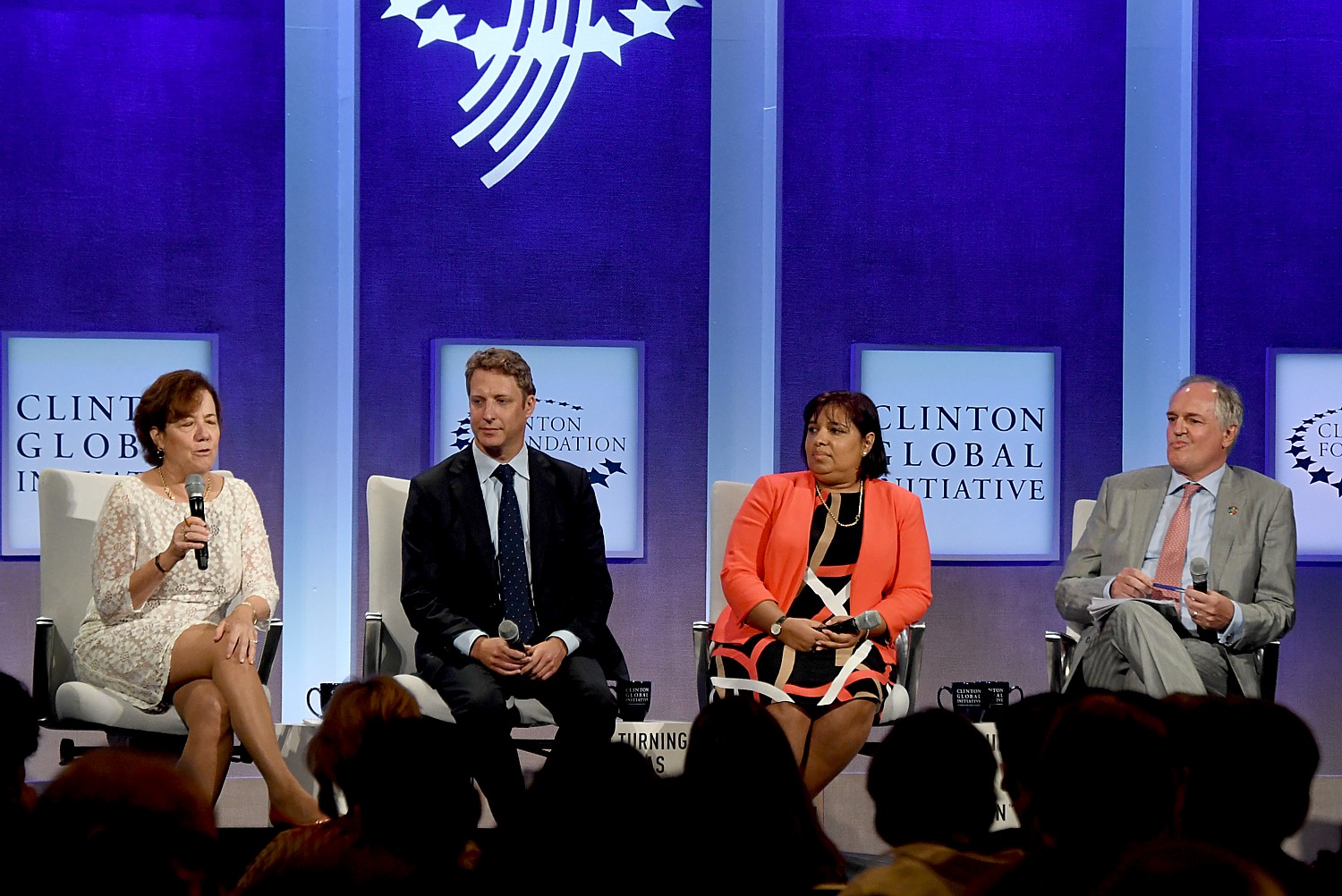
Turning Landfills into Goldmines: Can We Make the Circular Economy a Reality? Mindy Lubber, president of Ceres moderates panel with Stacey Davidson, Redisa; Ron Gonen, Closed Loop Partners; and Paul Polman, CEO Unilever © 2016 Karen Rubin/news-photos-features.com - Turning Waste into Energy at Zaatari Refugee Camp, Jordan
Commitment by: Solar CITIES
Partner(s): Arava Institute for Environmental Studies; Blueprint for Survival, Tamera ecoVillage; Foam Tech Insulation Services; HomeBiogas Israel; Schools for Sustainability; Solar CITIES – Palestine/Jordan Chapter; UNICEFNEW: In 2016, Solar CITIES committed to installing two biogas hubs and educating 50 new biogas technicians and closed-loop farmers in Jordan’s Zaatari refugee camp over the next three years. The biogas hubs will turn food and animal wastes into clean and safe fuel and fertilizer, while eliminating pathogens that cause illness and attract disease-carrying animals. The hubs will provide access to energy and opportunities for residents to learn, share and implement clean and renewable energy solutions within Zaatari, with future plans to expand to Greece, Lebanon and Turkey. The biogas technicians will become micro-waste management experts and closed-loop farmers will gain income by building farm- and community-scale biodigesters, selling the fertilizer and biogas, and working with Solar CITIES to schedule a series of workshops with local community members to scale biodigester construction. Increased access to renewable energy will reduce fossil fuel usage and indoor air pollution while controlling rodent and insect populations by better managing food waste at its source, ultimately impacting more than 11,000 residents and saving more than 100,000 KwH of energy.
- SOS: Focus on Syrian Medical Students & Doctors
Commitment by: Global Platform for Syrian Students
Partner(s): American University of Beirut; University Dohok, Iraq; University Nova, Lisbon; The Hashemite University, Jordan; World Health OrganizationNEW: In 2016, The Global Platform for Syrian Students, established by former President of Portugal Jorge Sampaio, committed to providing scholarships to 200 medical students who are displaced by the Syrian Civil War and to support specialist training programs for 200 Syrian doctors still working within the country in order to allow Syrians to continue their medical residency or post-graduate specialist training. This approach will help to address the challenges that Syrian medical students face both within and outside of the country, whose education and training have been interrupted by the conflict, and will invest in critical capacity building for the Syrian medical profession. The commitment will take place over three academic years and will begin with a pilot in 2016 with scholarships for 75 Syrian students in partner universities in Portugal, Jordan, Lebanon and Iraq, which will be scaled to additional students over the next three years. The specialist training in Syria will commence in early 2017, and the goal is that at least 30% of the students and doctors will be women.
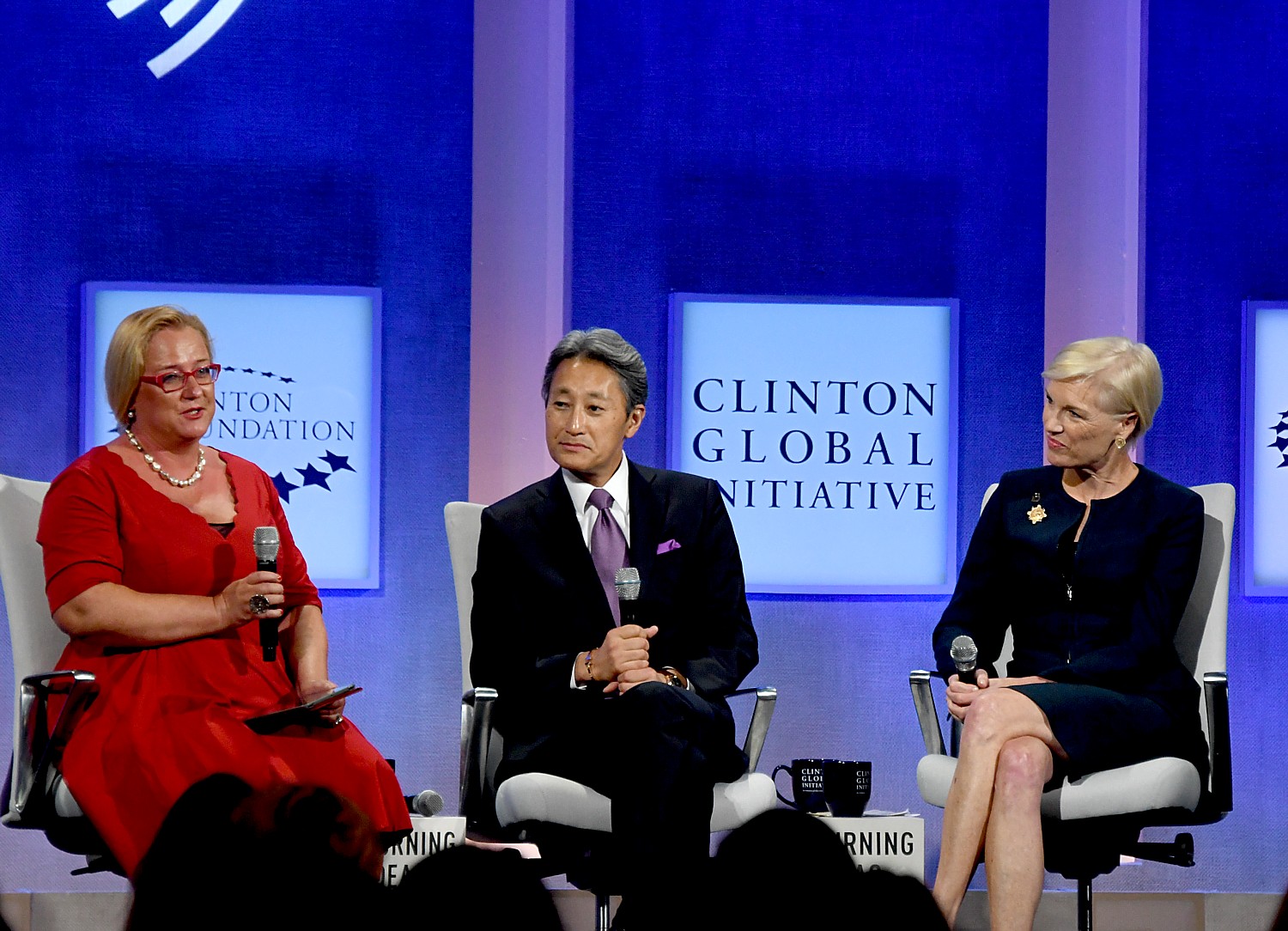
Katja Iversen, President and CEO, Women Deliver, moderates panel with Kazuo Hirai, CEO Sony Corporation, and Cecile Richards, President of Planned Parenthood © 2016 Karen Rubin/news-photos-features.com - Zika Prevention & Care
Commitment by: Direct Relief International
Partner(s): 3M Foundation; Ansell Limited; Asociacoin de Salud Primeria de Puerto Rico (ASPPR); Batey Relief Alliance; Florida Association of Community Health Centers (FACHC); Fundacion Ruth Paz; FUSAL; Greenlid Envirosciences; Hopital Albert Schweitzer; International Planned Parenthood Federation; Jamaica; Medtronic, Inc.; Ministerio de la Primera Infancia, Argentina; Ministry of Health of Jamaica; National Association of Community Health Centers; Proyecto Aldea Global; Texas Association of Community Health CentersNEW: In 2016, Direct Relief, in partnership with International Planned Parenthood Federation/Western Hemisphere Region (IPPF/WHR), Batey Relief Alliance, and others, committed to launch a multi-national response to the current Zika outbreak across Latin America, the United States, and the Caribbean. The multi-faceted response will focus on reproductive health and family planning, prenatal care, and the prevention of transmission through the distribution of essential commodities empowering communities to take preventative actions and make informed decisions about their health. This response will take the form of Zika Modules designed to protect against the transmission and the potentially devastating consequences of the virus. Direct Relief will distribute up to Zika Modules to partners involved in comprehensive, community-based Zika response efforts in Argentina, Dominican Republic, El Salvador, Guatemala, Haiti, Honduras, Jamaica, the United States (specifically Puerto Rico, Florida, and Texas), and Venezuela. Modules will include: insect repellent, biodegradable mosquito traps, digital thermometers, ultrasounds, fetal dopplers, and contraceptives.
Women Deliver Young Leaders Initiative
Commitment by: Women Deliver
Partner(s): European Parliamentary Forum; Global Fund for Women; Johnson & Johnson
PROGRESS REPORT: In 2012, Women Deliver committed to expand the youth component of its programming by scaling up its engagement with a diverse cohort of young people early in their careers. As a result of this commitment, young leaders will receive the following skills: basic and intermediate advocacy skills; information and communications technology skills; technical skills related to maternal health and sexual and reproductive health and rights; and networking and social media skills. In addition to a first round of e-learning opportunities offered in 2012, Young Leaders participated in a second e-course focused on deepening their ability to design and implement projects in their communities. The Young Leaders who successfully completed the e-course were eligible to submit a grant proposal to receive seed funding to implement a project in their community. Ten grants were awarded to Young Leaders in Mexico, Nigeria, Uganda, Cameroon, Bangladesh, Tanzania, and Zimbabwe. Sixteen Young Leaders, including all 10 seed grantees, attended The Partnership for Maternal, Newborn & Child Health Partners’ Forum in Johannesburg, South Africa as speakers, participants, facilitators, and bloggers, where they were able to share best practices, key learnings, and outcomes from their projects. The work of the Young Leaders continues to receive media attention, particularly at the national level. All of this has led to the creation of the Young Leaders Program, which, apart from increasing the number of Young Leaders to 200, includes a robust recruitment process, advocacy training and opportunities, a Speakers’ Bureau, alumni network, mentorship network, and more.
Global STEM Alliance (GSA) – 1000 Girls – 1000 Futures
Commitment by: New York Academy Of Sciences
Partner(s): AMIDEAST; AOL Charitable Foundation; ARM Holdings; British Council; Million Women Mentors; Motorola Solutions Foundation; Municipality of Barcelona; U.S. – Mexico Foundation; World Learning
PROGRESS REPORT: In 2014, the New York Academy of Sciences (the Academy) committed to launch a three-year, $2 million mentorship program to increase girls and women’s participation in STEM fields (science, technology, engineering, and math). The Academy developed a mentorship program that paired 1,000 high-school aged girls with mentors who study or work in STEM fields. The girls received year-long one-on-one mentor support, online training in foundational skills development, and the opportunity to attend an annual Program Summit. All items in the Action Plan to date for the 2015 cohort were accomplished. More than 300 girls from 12 countries were nominated for the program’s first cohort, and in an overwhelming show of support, more than 500 applications were received from professional women seeking to be mentors. As this first cohort of young women are now completing the online curriculum, Academy staff are actively preparing for the first Summit, scheduled to take place July 26-28, 2016, in New York City. Planning is also underway to offer the program to the second cohort of young women beginning in September 2016.
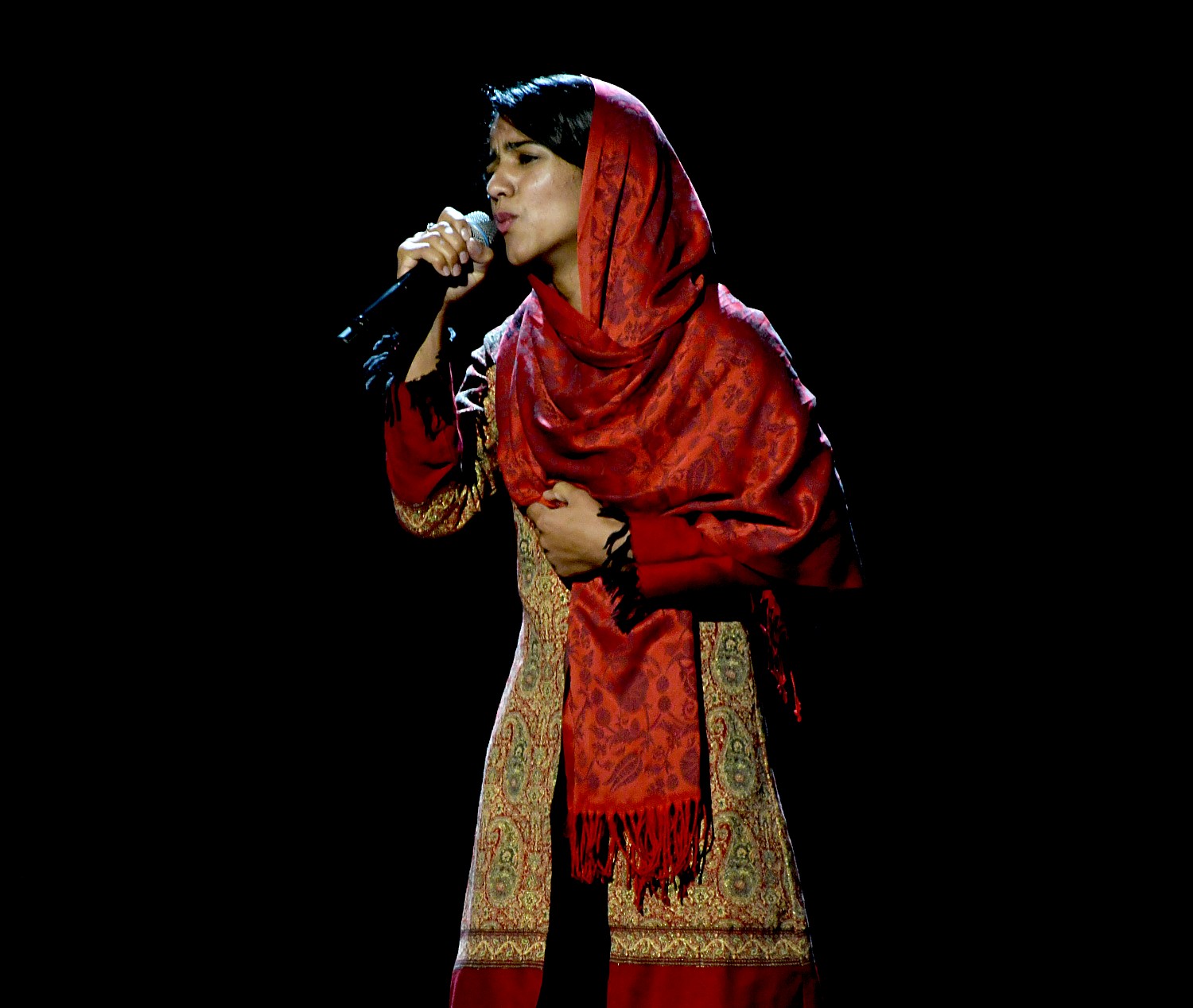
Addressing Harmful Practices: FGC and Child Marriage
Commitment by: United Postcode Lotteries
Partner(s): Amref Health Africa; Girls Not Brides; Tostan
PROGRESS REPORT: In 2013, The United Postcode Lotteries (UPL) committed, together with its partners AMREF, Tostan and Girls Not Brides, to work towards bringing an end to harmful practices affecting girls and young women, specifically child marriage and female genital cutting (FGC), with a specific focus on East and West Africa. This commitment brings together a donor focused on girls’ and women’s rights, a global partnership of almost 300 organizations based in 50 countries focused on child marriage, and two NGOs with a deep and proven commitment to working directly with communities in Africa to address these practices. A summary of key results so far (status bi-annual report year 3 implementation) include: 7,755 girls from Samburu, Magadi, Loitoktok, and Kilindi participated in one of the Alternative Rites of Passage; more than 100,000 girls, parents, and cultural elders were educated about the effects of FGC; 354 peer educators from the communities were trained in sexual and reproductive health, sexual and gender based violence, human rights, effects of FGC, Alternative Rites of Passage, and mobilization approaches; 850 Traditional Birth Attendants, who are often also circumcisers, were trained on the possible health effects of FGC. Many of them are now ARP ambassadors. The Alternative Rites of Passage is very mediagenic, especially in Kenya, USA, Canada, and the Netherlands, the project received attention in newspapers, magazines, online, television, and radio. Some of the projects key champion community leaders have been featured on national television. Nice Leng’ete, a campaigner/project officer, received international recognition from DFID as one of the most influential young campaigner, and Kenya’s first lady Margaret Kenyatta attended one of the Alternative Rites of Passage and has become a great supporter of Amref’s approach to tackle FGC.
Girls, Women & the Global Goals: Empowering Women Through Travel
Commitment by: Airbnb, Inc.
Partner(s): Global Fund for Women; Vital Voices Global Partnership
NEW: In 2016, Airbnb committed to accommodate the travel needs of Global Fund for Women and Vital Voices for convenings. The travel credits will be disseminated to more than 100 female entrepreneurs, small business owners, and human rights activists. Upon completion of the reports, Airbnb will explore a second phase of partnership with Vital Voices and Global Fund for Women. Airbnb will also focus on the economic impact of home sharing on female hosts and contribute to their broader strategy of economic empowerment. This commitment is part of the “Girls, Women & the Global Goals” coalition of multi-sectoral partners convened by No Ceilings, Vital Voices, and WEConnect International. The coalition is working collectively to advance gender equality and the Sustainable Development Goals agenda, particularly focused on the areas of promoting women’s economic participation; addressing violence against girls and women; and advancing women’s leadership in both private and public sectors.
Girls, Women & the Global Goals: Confronting
Commitment by: American Jewish World Service
Partner(s): The Kendeda Fund
NEW: In 2016, the American Jewish World Service (AJWS) committed to support 50 grassroots, capacity-building and research organizations to address child, early and forced marriage in India. Through strategic grant making and organizational meetings, AJWS will work on the local and national level in India and social movements to enable girls to have access to services in their communities. This commitment is part of the “Girls, Women & the Global Goals” coalition of multi-sectoral partners convened by No Ceilings, Vital Voices, and WEConnect International. The coalition is working collectively to advance gender equality and the Sustainable Development Goals agenda, particularly focused on the areas of promoting women’s economic participation; addressing violence against girls and women; and advancing women’s leadership in both private and public sectors.
Girls, Women & the Global Goals: Justice Institute on GBV
Commitment by: Avon Products, Inc.
Partner(s): Vital Voices Global Partnership
NEW: In 2016, Avon committed to support the creation of 10 new Justice Institutes in 2017 and 2018 in countries that represent top global markets, as well as in countries where previous Institutes are ready to expand. With a commitment of $1 million, Avon will support the training of 500 women throughout the expansion of 10 country Institutes over the course of two years from January 1, 2017 to December 31, 2018. This commitment is part of the “Girls, Women & the Global Goals” coalition of multi-sectoral partners convened by No Ceilings, Vital Voices, and WEConnect International. The coalition is working collectively to advance gender equality and the Sustainable Development Goals agenda, particularly focused on the areas of promoting women’s economic participation; addressing violence against girls and women; and advancing women’s leadership in both private and public.
Girls, Women & the Global Goals: Banking the Unbanked
Commitment by: CARE
NEW: In 2016, CARE committed to providing 500,000 women access to formal financial services in Africa and Asia by 2020. Presently, 1.1 billion women lack access to financial services, while many have access only to the informal financial sector. Given this deficit, CARE will widen women’s access to formal financial services through strengthening its Village Savings Loan Association network, identifying mature VSLA communities, leveraging its relationships with banks and mobile network operators, and developing culturally responsive digital products, where possible. Commencing in East Africa—where CARE has a large existing network—the commitment will expand to Western and Southern Africa and Asia from 2016 – 2020. Looking ahead, this commitment will contribute to CARE’s broader global strategy to provide 30 million women access to formal financial services by 2020.
Girls, Women & the Global Goals: Entrepreneurs & Tech
Commitment by: Cherie Blair Foundation For Women
NEW: In 2016, the Cherie Blair Foundation for Women committed to giving 10,000 women entrepreneurs access to digital channels, mentoring, and the valuable information they need to grow their businesses. The Foundation has committed to developing an application through its Technology Program that will deliver information via SMS to women entrepreneurs that will have a networking component. The commitment will identify one country to implement the project and will work with local partners, including a local NGO as well as a mobile network operator to deliver this commitment. This commitment is part of the “Girls, Women & the Global Goals” coalition of multi-sectoral partners convened by No Ceilings, Vital Voices, and WEConnect International. The coalition is working collectively to advance gender equality and the Sustainable Development Goals agenda, particularly focused on the areas of promoting women’s economic participation; addressing violence against girls and women; and advancing women’s leadership in both private and public sectors.
Girls, Women & the Global Goals: FITE Entrepreneur Accelerator
Commitment by: Dermalogica
Partner(s): City & Guilds Group; Operation Hope, Inc.; U.S. Small Business Administration
NEW: In 2016, Dermalogica committed to a two phase program to provide vocational training to women. Dermalogica has committed to creating industry specific business skills by building off of their FITE Entrepreneur Accelerator Program with free online classes to support vocational training education. The first phase will be the development of the online platform, which will then phase into marketing and distribution, as well as new courses added in 2017-2018. This commitment is part of the “Girls, Women & the Global Goals” coalition of multi-sectoral partners convened by No Ceilings, Vital Voices, and WEConnect International. The coalition is working collectively to advance gender equality and the Sustainable Development Goals agenda, particularly focused on the areas of promoting women’s economic participation; addressing violence against girls and women; and advancing women’s leadership in both private and public sectors.
Girls, Women & the Global Goals: Mining Communities
Commitment by: Freeport-McMoRan Inc.
Partner(s): Don Bosco Institute; Thunderbird School Of Global Management; WEConnect International
NEW: In 2016, Freeport-McMoRan committed to invest $5 million to promote women’s economic empowerment and address violence against women in four countries by 2021. Starting in 2017, Freeport-McMoRan will scale up its online platform DreamBuilder entrepreneurship training program for women to develop skills to strengthen their businesses. Broadly, Freeport-McMoRan will work to develop programs that will support women through resources, training, consulting services and mentoring. They will also offer at least $1 million in new capital to facilitate the growth of at least 60 women-owned businesses. This commitment is part of the “Girls, Women & the Global Goals” coalition of multi-sectoral partners convened by No Ceilings, Vital Voices, and WEConnect International. The coalition is working collectively to advance gender equality and the Sustainable Development Goals agenda, particularly focused on the areas of promoting women’s economic participation; addressing violence against girls and women; and advancing women’s leadership in both private and public sectors.
Girls, Women & the Global Goals: A Multi-Sector Approach
Commitment by: Global Fund for Women
Partner(s): Clinton Foundation; Vital Voices Global Partnership; WEConnect International
NEW: In 2016, Global Fund for Women committed to investing $3 million over a two year period in partnerships that will raise the visibility of women-led organizations removing barriers to gender equality globally. Global Fund for Women will make grants averaging $40,000 to grantee partners through their annual open call for proposals. This commitment will further contribute to the mission of Global Fund for Women to change the systems in which women and girls live and work; and build movements that catalyze transformation for individuals and societies. This commitment is part of the “Girls, Women & the Global Goals” coalition of multi-sectoral partners convened by No Ceilings, Vital Voices, and WEConnect International. The coalition is working collectively to advance gender equality and the Sustainable Development Goals agenda, particularly focused on the areas of promoting women’s economic participation; addressing violence against girls and women; and advancing women’s leadership in both private and public sectors.
Girls, Women & the Global Goals: Buying from Women
Commitment by: WEConnect International
Partner(s): EY; Freeport-McMoRan Inc.; IBM; Ingersoll Rand Company Ltd.; Pfizer Inc; Procter & Gamble; Walmart
NEW: In 2016, WEConnect International committed to expanding upon a previous CGI commitment to track and measure global contract opportunities for women owned business based outside of the U.S. WEConnect will focus on making it easier for corporations to find and do business with more women as suppliers and to measure their progress from 2016 to 2021. This commitment is part of the “Girls, Women & the Global Goals” coalition of multi-sectoral partners convened by No Ceilings, Vital Voices, and WEConnect International. The coalition is working collectively to advance gender equality and the Sustainable Development Goals agenda, particularly focused on the areas of promoting women’s economic participation; addressing violence against girls and women; and advancing women’s leadership in both private and public sectors.
Girls, Women & the Global Goals: McLarty Global Fellowship
Commitment by: McLarty Associates
Partner(s): Vital Voices Global Partnership
NEW: In 2016, The McLarty Global Fellowship committed to working with Vital Voices to contribute research to advance the research and advocacy for women and girls conducted by Vital Voices. The McLarty Global Fellowship will support two graduate students from the Clinton School at the University of Arkansas to spend a semester in Washington, DC advancing the work of Vital Voices. One Fellow will be assigned to the economic empowerment team at Vital Voices and the second Fellow will work directly with the Human Rights team. This commitment is part of the Girls, Women & the Global Goals coalition of multi-sectoral partners convened by No Ceilings, Vital Voices, and WEConnect International. The coalition is working collectively to advance gender equality and the Sustainable Development Goals agenda, particularly focused on the areas of promoting women’s economic participation; addressing violence against girls and women; and advancing women’s leadership in both private and public.
Girls, Women & the Global Goals: Skills Training for Women
Commitment by: Nest
Partner(s): If Hummingbird Foundation Inc.; West Elm
NEW: In 2016, Nest committed to reaching 100,000 artisans by expanding its Nest Professional Program by growing brand partnerships over the next three years. Craft production enables women to work while caring for dependents and provides employment where gender discrimination is prevalent. Nest’s commitment will match artisan producers with high caliber industry experts by leveraging brand partnership to ensure the work is not only efficient and effective, but also sustainable. This commitment is part of the “Girls, Women & the Global Goals” coalition of multi-sectoral partners convened by No Ceilings, Vital Voices, and WEConnect International. The coalition is working collectively to advance gender equality and the Sustainable Development Goals agenda, particularly focused on the areas of promoting women’s economic participation; addressing violence against girls and women; and advancing women’s leadership in both private and public sectors.
Girls, Women & the Global Goals: Business Development
Commitment by: Procter & Gamble
Partner(s): WEConnect International
NEW: In 2016, Proctor and Gamble committed to implementing Women’s Business Development Programs in order to train 100 women business owners by 2017. P&G will initially target the following countries: China, Mexico, Turkey, South Africa, and the United States. Ultimately, this commitment will contribute to P&G’s goal of enabling women business owners to build their business and have a greater economic impact in the communities in which they operate. This commitment is part of the “Girls, Women & the Global Goals” coalition of multi-sectoral partners convened by No Ceilings, Vital Voices, and WEConnect International. The coalition is working collectively to advance gender equality and the Sustainable Development Goals agenda, particularly focused on the areas of promoting women’s economic participation; addressing violence against girls and women; and advancing women’s leadership in both private and public sectors.
Girls, Women & the Global Goals: End Workplace Violence
Commitment by: Sodexo Group
NEW: In 2016, Sodexo committed to improve the quality of life of women in the communities it serves by focusing on gender equality and empowerment through operations in Latin America and India. By August 2019, Sodexo will: 1) Promote awareness of gender-based violence; 2) Provide in-depth training about gender-based violence prevention; 3) Provide economic opportunity for survivors of violence; and 4) Lead collaboration in the countries where they work to make a larger impact in the community. This commitment is part of the Girls, Women & the Global Goals coalition of multi-sectoral partners convened by No Ceilings, Vital Voices, and WEConnect International. The coalition is working collectively to advance gender equality and the Sustainable Development Goals agenda, particularly focused on the areas of promoting women’s economic participation; addressing violence against girls and women; and advancing women’s leadership in both private and public sectors.
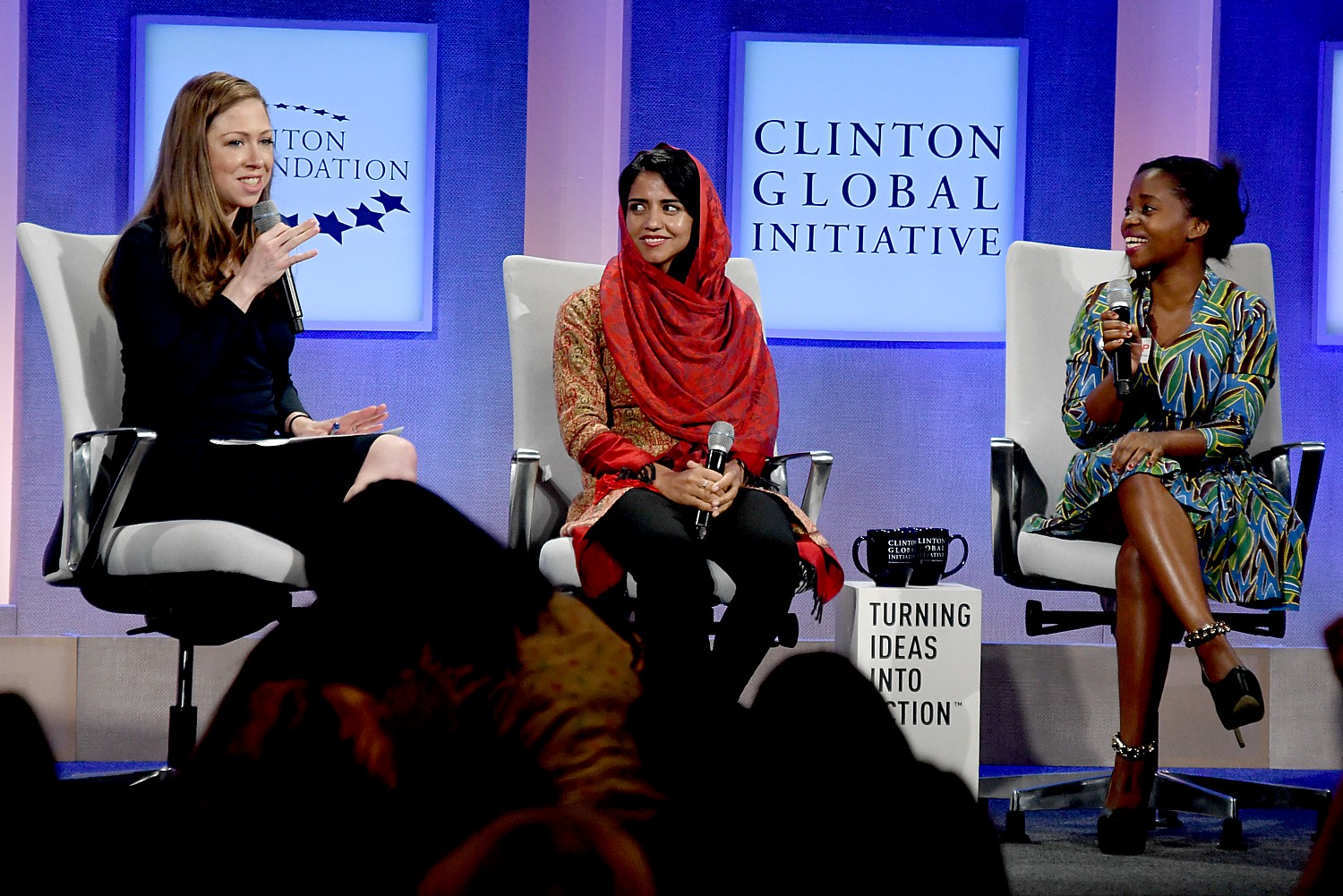
Girls, Women & the Global Goals: Every Hour Matters Campaign
Commitment by: Together For Girls
Partner(s): Becton, Dickinson and Company; CARE; Child Helpline International; Cummins&Partners; Pan-American Health Organization; SafeTrek; Save the Children; United Nations Women; Women Deliver; World Health Organization
NEW: In 2016, Through its Every Hour Matters campaign, Together for Girls committed to assisting girls and women who have experienced rape or sexual assault. Sexual violence is a pervasive problem that leaves a proportion of survivors with only 72 hours to receive life-saving post exposure prophylaxis to prevent HIV and 120 hours to receive emergency contraception. Together for Girls will increase awareness of the importance of rapid access to post-rape care by increasing the public’s awareness and building partnerships with leaders to improve survivors’ access to comprehensive services. This commitment is part of the “Girls, Women & the Global Goals” coalition of multi-sectoral partners: Vital Voices, and WEConnect International. The coalition is working collectively to advance gender equality and the Sustainable Development Goals agenda, particularly focused on the areas of promoting women’s economic participation; addressing violence against girls and women; and advancing women’s leadership in both private and public sectors.
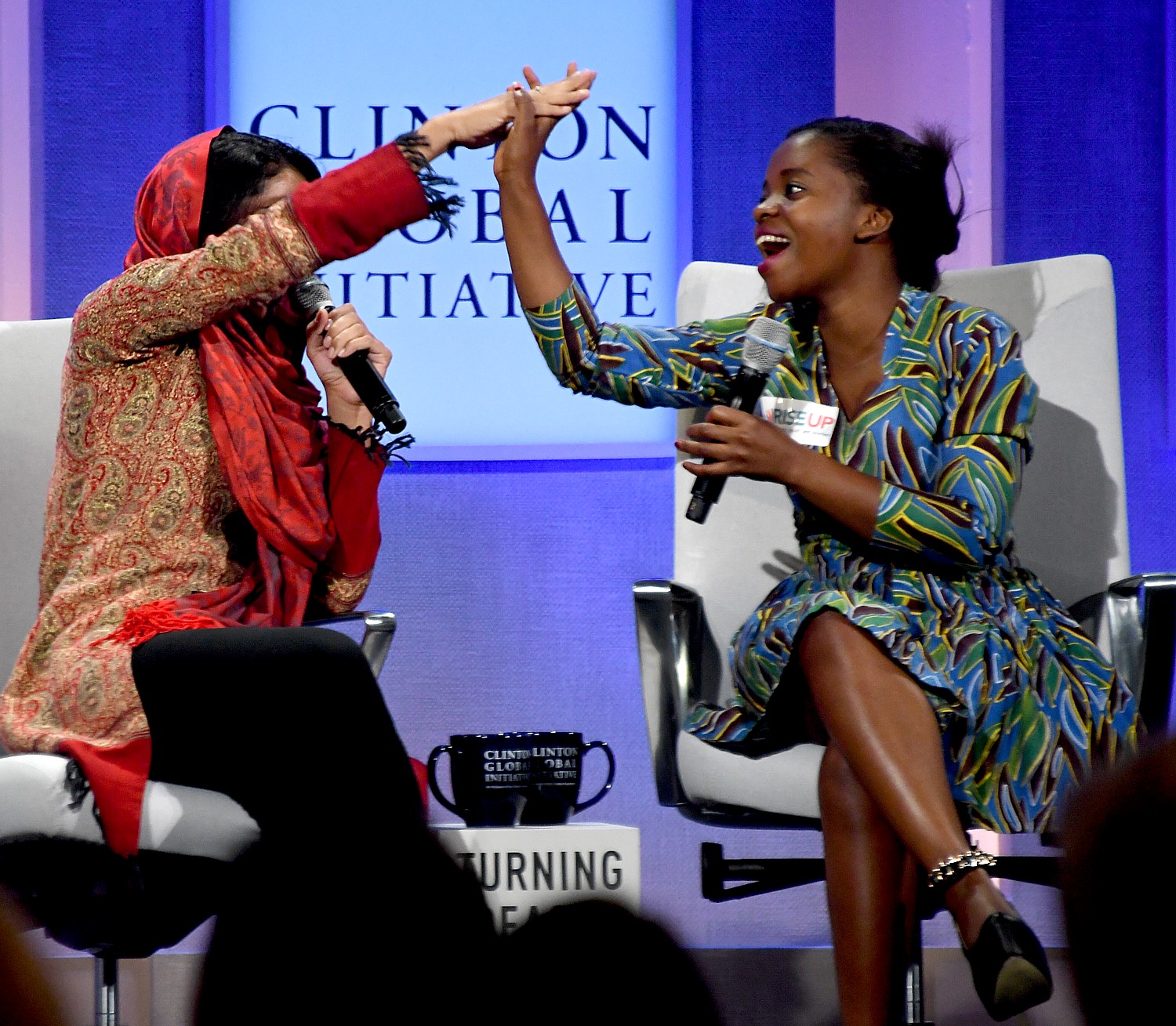
Girls, Women & the Global Goals: Ending Gender-Based Violence
Commitment by: United Nations Women
NEW: In 2016, the UN Trust Fund to End Violence Against Women committed to funding $1 million in grants targeting projects and supporting civil society organizations that empower refugee women and girls in an effort to address the issue of sexual and gender based violence experienced by refugee women and girls. Prioritizing countries that have been impacted by the ongoing refugee crisis. This commitment is part of the “Girls, Women & the Global Goals” coalition of multi-sectoral partners convened by No Ceilings, Vital Voices, and WEConnect International. The coalition is working collectively to advance gender equality and the Sustainable Development Goals agenda, particularly focused on the areas of promoting women’s economic participation; addressing violence against girls and women; and advancing women’s leadership in both private and public sectors.
Girls, Women & the Global Goals: Empowering Changemakers with Pond’s
Commitment by: Unilever
Partner(s): Vital Voices Global Partnership
NEW: In 2016, Unilever launched a fellowship program that will invest in 100 emerging global women leaders over the next four years through its brand Pond’s. This commitment is part of the “Girls, Women & the Global Goals” coalition of multi-sectoral partners convened by No Ceilings, Vital Voices, and WEConnect International. The coalition is working collectively to advance gender equality and the Sustainable Development Goals agenda, particularly focused on the areas of promoting women’s economic participation; addressing violence against girls and women; and advancing women’s leadership in both private and public sectors.
Girls, Women & the Global Goals: Dignified Jobs for India’s Poorest
Commitment by: Upaya Social Ventures
Partner(s): anant Learning and Development Pvt. Ltd; Krishi Star; Maitri; Open Road Alliance; Saahas; Tamul Plates
NEW: In 2016, Upaya committed to investing in more women led enterprises over the next three years to increase the total number of women in its portfolio by 50%. Upaya will invest in agribusiness, skill development, and labor intensive manufacturing businesses. These businesses will participate in a financial management program. Over three years, Upaya will work with 50 companies and invest in 10 of them. This new approach will allow Upaya to create new partnerships with industry experts and investors to empower women entrepreneurs. This commitment is part of the “Girls, Women & the Global Goals” coalition of multi-sectoral partners convened by No Ceilings, Vital Voices, and WEConnect International. The coalition is working collectively to advance gender equality and the Sustainable Development Goals agenda, particularly focused on the areas of promoting women’s economic participation; addressing violence against girls and women; and advancing women’s leadership in both private and public sectors.
Girls, Women & the Global Goals: Tech for Women’s Rights
Commitment by: WAKE: Women’s Alliance for Knowledge Exchange
NEW: In 2016, WAKE committed to investing in three to five NGOs from its Tech2Empower (T2E) initiative, a tech and communications training workshop for leaders of women’s rights organizations. WAKE’s commitment will focus on three expansions of T2E: expanding to two new regions (Central America, the Caribbean, and sub-Saharan Africa); launching T2E Fellowships; and establishing Learning Hubs. In its expansion WAKE will hold T2E workshops to train NGO leaders in the two regions, which will provide a foundation for T2E Fellowships and Learning Hubs. This commitment is part of the “Girls, Women & the Global Goals” coalition of multi-sectoral partners convened by No Ceilings, Vital Voices, and WEConnect International. The coalition is working collectively to advance gender equality and the Sustainable Development Goals agenda, particularly focused on the areas of promoting women’s economic participation; addressing violence against girls and women; and advancing women’s leadership in both private and public sectors.
Girls, Women & the Global Goals: Delivering for Good
Commitment by: Women Deliver
Partner(s): Together For Girls
NEW: In 2016, Women Deliver committed to launching a four year global campaign, Deliver for Good, which promotes investments (political, programmatic, and financial) in girls and women, specifically focusing on violence against girls and women. This commitment is part of the “Girls, Women & the Global Goals” coalition of multi-sectoral partners convened by No Ceilings, Vital Voices, and WEConnect International. The coalition is working collectively to advance gender equality and the Sustainable Development Goals agenda, particularly focused on the areas of promoting women’s economic participation; addressing violence against girls and women; and advancing women’s leadership in both private and public sectors.
Girls, Women & the Global Goals: Empowering Women in Conflict Areas
Commitment by: Women For Women International
Partner(s): Kingdom of the Netherlands
NEW: In 2016, Women for Women International (WfWI) commits to supporting economic empowerment activities for socially and economically marginalized women over the age of 18 who are in the greatest need, through its comprehensive women’s empowerment program. Through this program, WfWI will focus on developing a curriculum reaching 25 women that would build empowerment skills and engaging men in activities that will address issues of violence against girls and women. This commitment is part of the “Girls, Women & the Global Goals” coalition of multi-sectoral partners convened by No Ceilings, Vital Voices, and WEConnect International. The coalition is working collectively to advance gender equality and the Sustainable Development Goals agenda, particularly focused on the areas of promoting women’s economic participation; addressing violence against girls and women; and advancing women’s leadership in both private and public sectors.
Girls, Women & the Global Goals: Advancing Women in the Workforce
Commitment by: Women’s Funding Network
NEW: In 2016, Women’s Funding Network committed to build their Advancing Women in the Workforce program with up to 10 women’s foundations in the US. This one-year commitment will secure $30,000 in funding from its members to launch a women’s economic security digital storytelling platform that will drive engagement with women’s foundations and provide a valuable fundraising tool and 70,000 to work in target communities. This commitment is part of the “Girls, Women & the Global Goals” coalition of multi-sectoral partners convened by No Ceilings, Vital Voices, and WEConnect International. The coalition is working collectively to advance gender equality and the Sustainable Development Goals agenda, particularly focused on the areas of promoting women’s economic participation; addressing violence against girls and women; and advancing women’s leadership in both private and public sector.
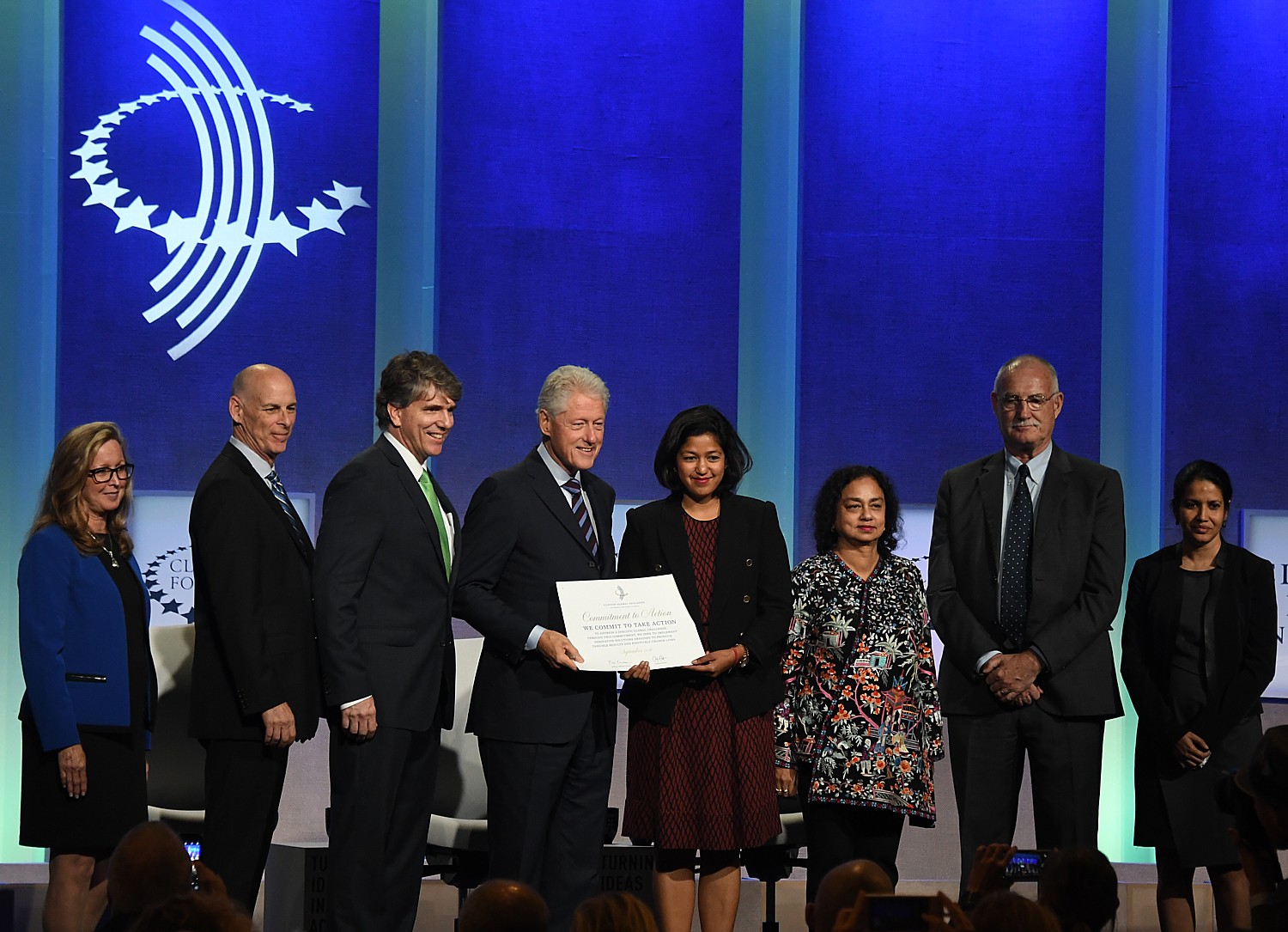
Pathway to Social Entrepreneurship for Young Leaders
Commitment by: The Resolution Project
Partner(s): African Leadership Academy; Axiom Investment Advisors; Coca-Cola Scholars Foundation; DuPont Company; Echoing Green; General Electric; Gerson Lehrman Group, Inc.; Group 113; Harvard University; Hatzimemos Libby; Jim Mannino Public Relations; National Society of High School Scholars; Semester at Sea; The Geraldine y Gabriel Sunshine Foundation; The World Model UN Conference
PROGRESS REPORT: In 2014, The Resolution Project (‘Resolution’) committed to expand its Resolution Fellowship to support 400 college students from across the globe who seek to address an array of global challenges through social entrepreneurship. Resolution also launched new initiatives – the Resolution Institute, Pathway and Corporate Program Partnerships, the Fellow Resources System, and The Resolution SOLVE Summit – to provide a comprehensive ecosystem of resources for young social entrepreneurs. More than 60% of Resolution Fellows report they would have been unlikely to launch their social venture without the support of Resolution, proving that they play a catalytic role in their Fellows’ development as socially responsible leaders. Resolution Fellows report improvements in their adaptability, leadership, and organizational skills and note that Resolution has helped them respond to challenges and obstacles. Resolution Fellows have gone on to secure more than $2.5 million in additional funding through revenue, grants, awards, etc. More than 90% of Resolution Fellows report high satisfaction rates with the mentorship they receive from volunteer Guides.
From Divisive Crisis to Inclusive Cities: Catalyzing Transformative Partnerships in Greater Monrovia
Commitment by: Cities Alliance
Partner(s): Comic Relief; Habitat For Humanity International; Ministry of Internal Affairs, Department of Urban Affairs, Government of Libera; Monrovia City Corporation (MCC); Paynesville City Corporation (PCC); Shack/Slum Dwellers International; StreetNet International; UN-Habitat; United Cities and Local Governments Africa; UNOPS; Women In Informal Employment: Globalizing And Organizing; YMCA Liberia
NEW: In 2016, Cities Alliance committed to improving the lives of 400,000 slum dwellers in Greater Monrovia, Liberia by empowering local residents to create lasting change in their communities through partnership with government, the private sector and civil society. Cities Alliance, in partnership with local and national government, UCLG, UN-Habitat, UNOPS, Habitat for Humanity International, Comic Relief, YMCA, WIEGO, StreetNet International, and SDI will mobilize communities and equip them to undertake comprehensive urban development solutions, enabling basic service improvements, affordable housing schemes, enhanced small business opportunities and resilience upgrades in existing slums and poor neighborhoods, including in hazard prone coastal and wetland areas. Empowering local communities and building capacity among civic leaders via neighborhood associations, Cities Alliances wishes to bridge the existing gap between slum dwellers and both local and national levels of government, improving strategic urban planning frameworks and enhancing national enabling environments, in order to develop and bring about meaningful change in the lives of the urban poor.
MHNOW: Closing the Mental Health Treatment Gap
Commitment by: Global Development Incubator
Partner(s): Arogya World; Basic Needs; Children’s Health Fund; Clear Village; Falkora; Global Futures Group; Grand Challenges Canada; Hans Foundation; Harvard School Of Public Health; International Institute for Mental Health Leadership; International Medical Corps; Johnson & Johnson; Keystone Human Services; King’s College London; Many Minds Collaborative; Peter C. Alderman Foundation; Step Up on Second; StrongMinds, Inc.
NEW: In 2016, the Global Development Incubator, BasicNeeds, Johnson & Johnson, Grand Challenges Canada and 20 others committed to launch mhNOW (Mental Health Now), a Multi-Stakeholder Initiative (MSI) to catalyze, connect, and support cities committed to driving change in the field of mental health. mhNOW’s ambition is to activate leadership and empower cities to catalyze cross-sector collective actions to close the mental health gap in 30 cities by 2030. The mhNOW MSI will mobilize and channel resources and networks to city projects through a challenge prize and through technical assistance to 1) scale local innovations; 2) mobilize youth leadership; and 3) improve the evidence base for the return on investment in mental health and establish a monitoring and evaluation framework to aggregate city and global data indicators. During its first year, partners will engage communities as various as Kenya, Ethiopia, Ghana, India, Vietnam, Singapore, and the United States and in cities that span from Nairobi and Chennai to Philadelphia and Flint.
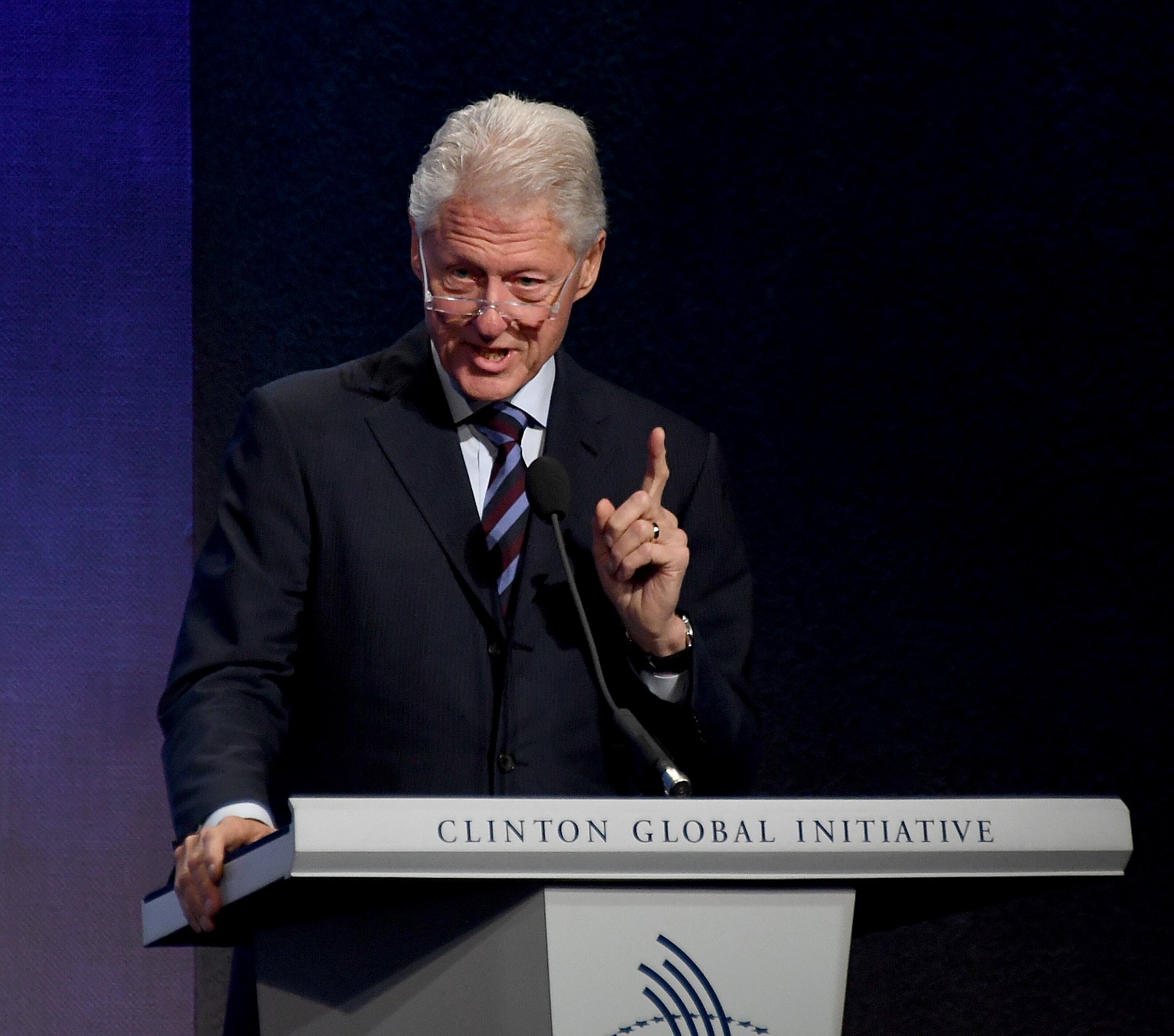
CGI CEO Bob Harrison published a piece in the Huffington Post on the many ways CGI and its members have transformed modern philanthropy. In it, he notes:
- CGI members have frequently come together to find unconventional partners—across sectors—for collective impact:“A 2014 analysis of CGI commitments reveals that the most successful Commitments to Action involve partnerships. Since 2005, members of the CGI community have worked together to leverage each organization’s strengths and expertise to achieve their shared goals for social impact.”
- CGI members have helped define innovative investing for social good: “CGI members have created and scaled innovative investment models—pioneering methods that have become the new standard.”
- CGI members have put girls and women at the center of every issue: “The unique challenges facing girls and women worldwide are at the forefront of CGI programming and are integrated across all our focus areas. Whether a commitment targets technology, health care, the environment, or education—members are encouraged to integrate the perspective of girls and women into both the design and implementation of their commitments. To date, CGI members have supported 11 million girls and women through empowerment initiatives.”
- CGI members have responded quickly to disasters and have helped make our communities more resilient: “When disaster strikes, the CGI community is positioned to act fast—it comes together to assess needs and assist with critical resources.”
- CGI members have advanced the approach of “doing well by doing good:” “For the past 11 years, President Clinton has been a leading advocate for engaging the private sector to create positive change. This philosophy of “doing well by doing good” has been enthusiastically embraced by CGI members from the business community, whose commitments have transcended conventional Corporate Social Responsibility and have helped push modern philanthropy forward.”
Devex provided a preview of the program and will be exploring CGI’s legacy and the role it has played in developed in its coverage throughout the event.
In a New York Times piece that discussed recent developments in the ivory trade, CGI’s three-year long campaign to save the elephant population was highlighted. Progress on this commitment will be announced in the coming days.
CGI commitment-maker Ubuntu’s Jake Lief wrote in Quartz on how leadership lessons for charities often come from stories about failure.
CGI CEO Bob Harrison discussed the 2016 CGI Annual Meeting and how CGI has changed philanthropy on Bloomberg Radio.
Last week on CNN, Clinton Foundation President Donna Shalala discussed the Annual Meeting and CGI’s impact across the world.
AFT President Randi Weingarten highlighted CGI’s unique model of bringing unlikely partners together in an op-ed for the Huffington Post.
CGI staff also reflected on the magnitude of the Clinton Global Initiative and its legacy, watch the video here: https://youtu.be/YhhDzra5SuM
To watch major plenary and breakout sessions, go to http://live.clintonglobalinitiative.org.
For a timeline of the Clinton Global Initiative over the years, visit https://www.clintonfoundation.org/sites/default/files/cgi_timeline.pdf.
For more information, visit clintonglobalinitiative.org; follow on Twitter @ClintonGlobal and Facebook at facebook.com/clintonglobalinitiative.
__________________
© 2016 News & Photo Features Syndicate, a division of Workstyles, Inc. All rights reserved. For editorial feature and photo information, go to www.news-photos-features.com, email editor@news-photos-features.com. Blogging at www.dailykos.com/blogs/NewsPhotosFeatures. ‘Like’ us on facebook.com/NewsPhotoFeatures, Tweet @KarenBRubin

